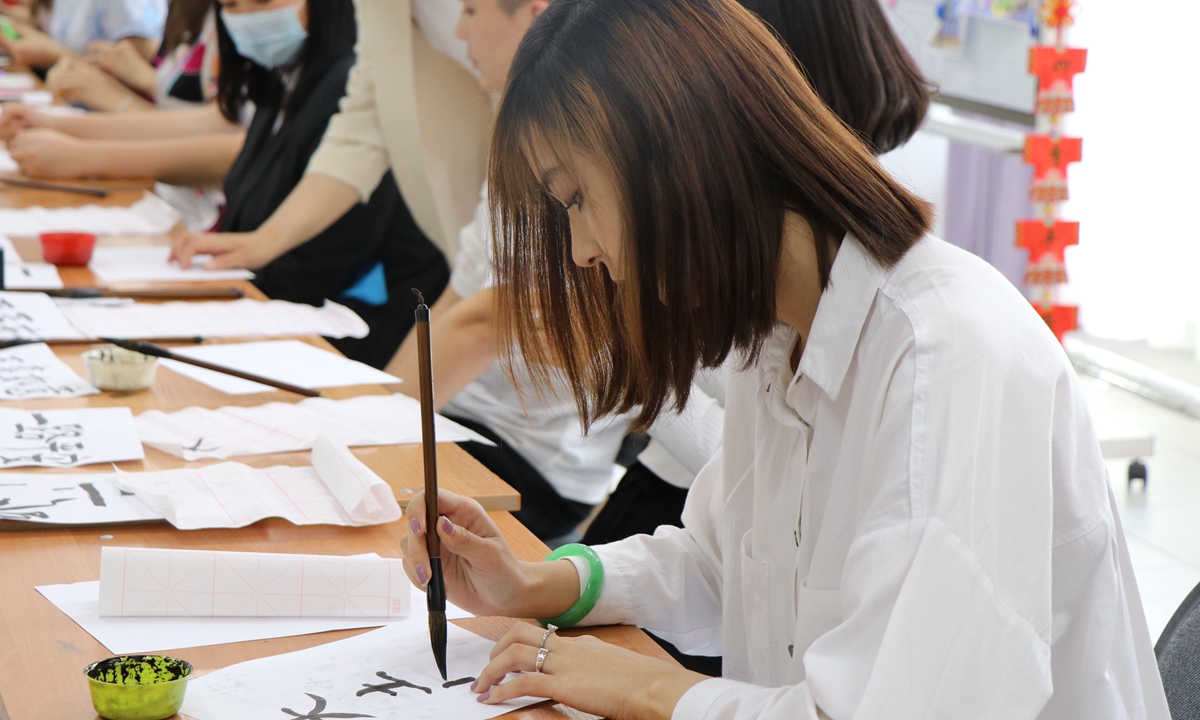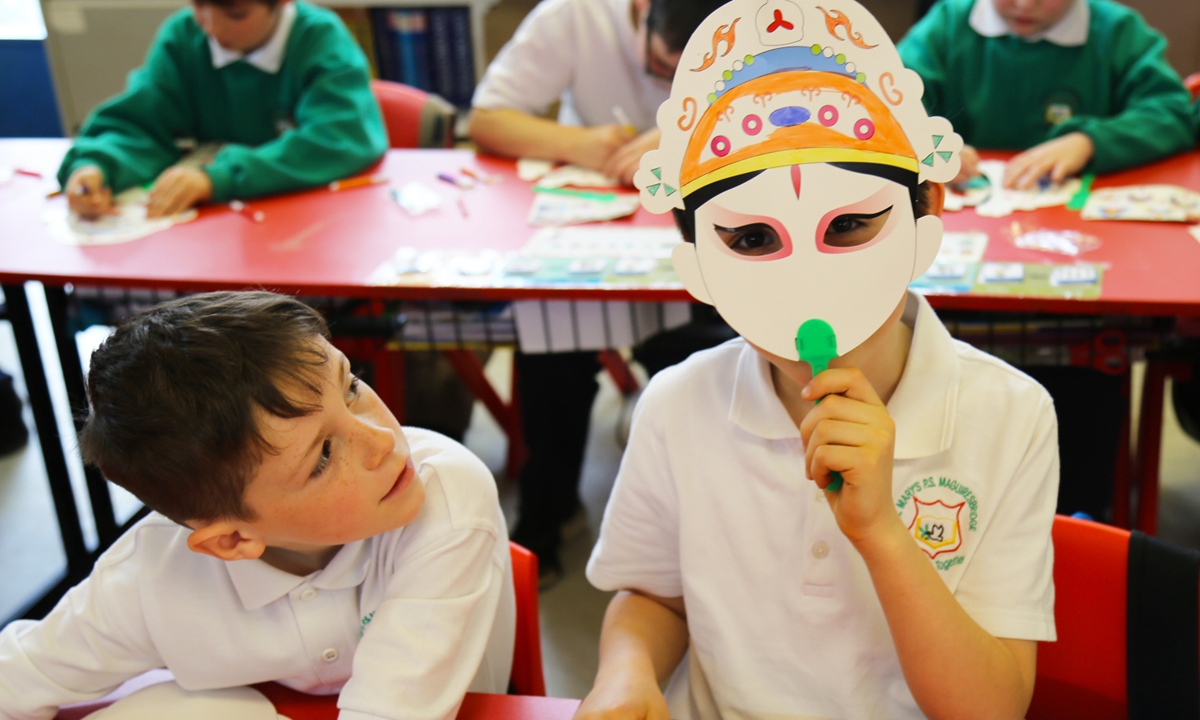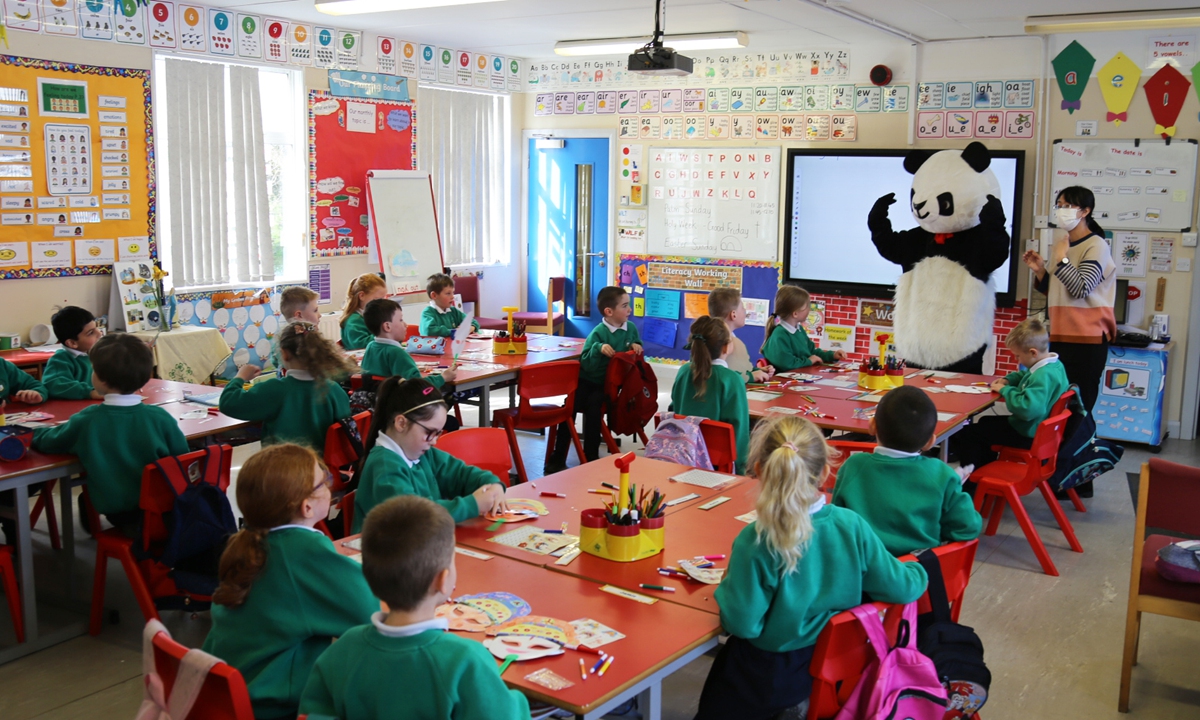Peking University, April 23, 2022: The 13th UN Chinese Language Day was celebrated on Wednesday. More than 300 embassies and consulates, Chinese educational institutions and enterprises from over 100 countries held a variety of activities to promote the Chinese language and Chinese culture around the world.
Students write calligraphy at a cultural event for UN Chinese Language Day in Almaty, Kazakhstan on April 15. Photo: Courtesy of Consulate General of China in Almaty
Students take part in a Chinese cultural event at the Confucius Classroom in St. Mary's Primary School, the UK on April 6. Photos: Courtesy of St. Mary's Primary School
Students take part in a Chinese cultural event at the Confucius Classroom in St. Mary's Primary School, the UK on April 6. Photos: Courtesy of St. Mary's Primary School
The day was set for April 20 as this is the date around which Grain Rain, one of the 24 Solar Terms in the traditional Chinese calendar. Grain Rain was a day for celebrating Cangjie, a legendary figure traditionally held to be the inventor of Chinese characters, as when he created them, "the sky rained millet."
Global event
As the day approached, institutions around the world held various activities.
China's Center for Language Education and Cooperation (CLEC) and Chinese Plus launched the International Chinese Language Day themed "Together for a Bright Future."
The Xinhua News Agency reported that an educational partnership between China and South Africa on Tuesday brought Chinese tea culture to Cape Town's Groot Constantia, the oldest South African wine farm, to promote the exchanges of culture and celebrate UN Chinese Language Day.
Over in the UK, the Confucius Classroom at St. Therese of Lisieux Primary School, run by the Confucius Institute at Ulster University in Northern Ireland, held a Chinese cultural experience event on April 8. Photos show a Chinese teacher dressed in a panda costume greeting students at the entrance to the classroom. The students were very surprised to see the panda, giving it high fives and hugs.
"We believe the idea that 'Chinese culture' should be a comprehensive one that includes both traditional and contemporary elements," Nick Liu, principle of the Confucius Institute at the Coventry University in England, told the Global Times.
"This is the crux for many overseas Confucius institutes to consider. In the past, we shared mostly traditional Chinese culture such as taijiquan, calligraphy and so on. But in the future, we should show overseas Chinese culture lovers the face of today's China. For example, collaborating with AI and technology experts to share their designs, or inviting architects who design today's Chinese urban areas to introduce their modern views about China. Creative events and products about historical Chinese culture should also be introduced overseas as well."
The Confucius Institute of Moscow State Linguistic University on Saturday organized a "Colorful China" immersive cultural experience that saw teachers introduce the origin of Chinese Language Day and the 24 Solar Terms to the students.
Chinese embassies in Brazil and Kazakhstan also held related activities.
Growing influence
Shah Nishith Avinash, who once studied in a Confucius Institute, has set up his own business by opening the India China Academy in India. He told the Global Times that they also held an activity for students at the academy on Tuesday.
"We tried some Chinese food together, and played a game which requires the students to guess the meaning of some Chinese exotic vocabulary such as coffee, sofa and calorie. We had a lot of fun," he told the Global Times on Wednesday.
One Indian student who participated in the event told the Global Times on Wednesday that she started studying Chinese when he was 40 years old. As a tea seller, she has a lot of customers from China and she hopes she can communicate with customers without the help of translators.
Zhang Yiwu, a professor of cultural studies at Beijing's Peking University, told the Global Times on Wednesday that Chinese language is becoming more popular around the world thanks to China's increased international influence.
He pointed out that the Chinese economy has developed rapidly over the past few years and its enhanced international business cooperation has led to high demand for people in other countries who can speak Chinese and understand Chinese culture.
According to a report released by CLEC, by the end of 2021, more than 1,500 Confucius institutes and classrooms had been established in 159 countries through international cooperation, with more than 13 million students taking part. Additionally, 76 countries have included learning Chinese as part of their national education systems and more than 4,000 universities have established Chinese-related departments and majors.
Currently, more than 25 million people overseas are learning Chinese, while the cumulative number of people who have studied Chinese is close to 200 million.
David Kolosov, a 29-year-old Russian who started learning Chinese in China in 2007, expressed his excitement early Wednesday for a speech he would present online for 2022 International Chinese Language Day at the UN later that night.
He told the Global Times that Chinese has opened a door for him to another world as the language has the largest number of native speakers and is also one of the oldest languages in the world.
"I have been in China for almost a decade, which means I have spent about a third of my life so far in China. It has become an indispensable part of my life. It is like Chinese characters made up of countless criss-crossing horizontal and vertical strokes. It takes a lifetime to taste its charm. There are still a lot of things that I don't understand, and I will continue to study hard."


